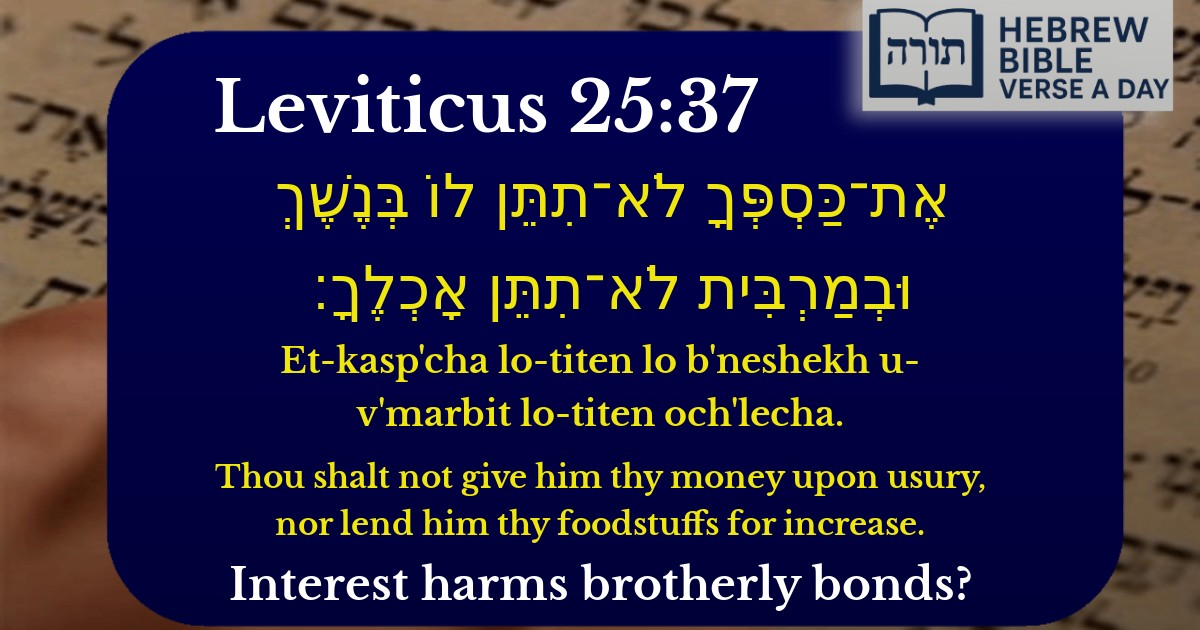Join Our Newsletter To Be Informed When New Videos Are Posted
Join the thousands of fellow Studends who rely on our videos to learn how to read the bible in Hebrew for free!
Hebrew Text
אֶת־כַּסְפְּךָ לֹא־תִתֵּן לוֹ בְּנֶשֶׁךְ וּבְמַרְבִּית לֹא־תִתֵּן אָכְלֶךָ׃
English Translation
Thou shalt not give him thy money upon usury, nor lend him thy foodstuffs for increase.
Transliteration
Et-kasp'cha lo-titen lo b'neshekh u-v'marbit lo-titen och'lecha.
Hebrew Leining Text
אֶ֨ת־כַּסְפְּךָ֔ לֹֽא־תִתֵּ֥ן ל֖וֹ בְּנֶ֑שֶׁךְ וּבְמַרְבִּ֖ית לֹא־תִתֵּ֥ן אׇכְלֶֽךָ׃
אֶ֨ת־כַּסְפְּךָ֔ לֹֽא־תִתֵּ֥ן ל֖וֹ בְּנֶ֑שֶׁךְ וּבְמַרְבִּ֖ית לֹא־תִתֵּ֥ן אׇכְלֶֽךָ׃
🎵 Listen to leining
Parasha Commentary
📚 Talmud Citations
This verse is quoted in the Talmud.
📖 Bava Metzia 70b
The verse is discussed in the context of the laws prohibiting usury (ribbit). The Talmud explores the implications of lending money or food with interest, emphasizing the biblical prohibition.
📖 Sanhedrin 25b
The verse is referenced in a discussion about the severity of taking usury, comparing it to other serious transgressions.


Prohibition of Interest (Ribbit)
The verse (Vayikra 25:37) prohibits lending money or food with interest (נשך and מרבית). Rashi explains that נשך refers to biting interest—like a snakebite that starts small but grows—while מרבית refers to excessive interest. The Torah forbids both forms, emphasizing the severity of exploiting another Jew's financial need.
Halachic Implications
Rambam (Hilchot Malveh v'Loveh 4:1-2) elaborates that this prohibition applies to all forms of benefit derived from a loan, not just monetary interest. For example:
Moral and Social Dimensions
The Sefer HaChinuch (Mitzvah 572) teaches that this mitzvah fosters compassion and unity among Jews. Lending without interest ensures that those in need are supported without exploitation, reinforcing the principle of "ואהבת לרעך כמוך" (Vayikra 19:18). The Talmud (Bava Metzia 71a) warns that violating this prohibition incurs severe consequences, as it undermines societal trust.
Exceptions and Permissions
The Shulchan Aruch (Yoreh De'ah 160) permits charging interest to non-Jews under certain conditions, based on Devarim 23:21. However, many poskim, including the Rema, caution against exploiting this leniency, as it could lead to chillul Hashem (desecration of G-d's name).